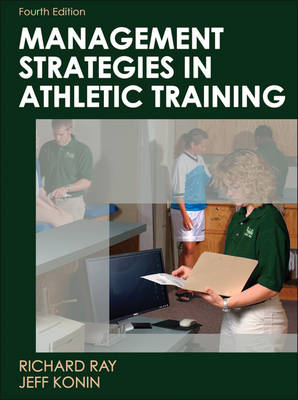
Management Strategies in Athletic Training
Human Kinetics (Verlag)
978-0-7360-7738-5 (ISBN)
- Titel ist leider vergriffen;
keine Neuauflage - Artikel merken
The text, part of Human Kinetics' Athletic Training Education Series, is an excellent resource for building comprehensive knowledge of management theory as well as the problem-solving skills to put it to practical use. The book's organization strategies can also be applied beyond athletic training to a variety of fields related to sports medicine, making it a valuable resource for any sports medicine professional.
Management Strategies in Athletic Training, Fourth Edition, has been significantly improved to align with the Health Care Administration portion of the National Athletic Trainers' Association (NATA) Role Delineation Study. With extensive updates and new information, the fourth edition emphasizes the practice of evidence-based medicine and offers 18 new sections of material that include the following:
-Health care financial management
-Injury surveillance systems
-Advances in patient charting
-Cultural awareness
-Marketing a sports medicine practice
-OSHA requirements for health care facilities
Designed to encourage critical thinking, the fourth edition of Management Strategies in Athletic Training opens and closes each chapter with realistic and fascinating case studies presenting real-world dilemmas faced by athletic trainers. A series of questions at the end of these scenarios challenge students to analyze and apply the principles in the chapters to solve the hypothetical situations and ultimately prepare them for the kinds of problems they will face from day to day as professionals. To support learning, the text includes tools such as chapter objectives, key terms, and review statements as well as sample administrative forms that readers can both study and adapt to their own work situations. Special elements and appendixes provide direction for deeper study by referring students to Internet resources, other Athletic TrainingEducationSeries texts, sample forms for analysis of athletic training programs, and material on regulations and ethics in athletic training. In addition, the fourth edition covers new material that students will find helpful as they embark on their athletic training careers, such as compensation, tips for finding a job, and negotiating skills for accepting a job.
For instructors, an ancillary package consisting of an instructor guide, test bank, and new image bank will aid in course development. Loaded with additional case studies, course projects, chapter worksheets, and a sample course syllabus, these materials can be used for organizing classes, testing students' knowledge, and creating exciting learning experiences.
Richard Ray, EdD, ATC, is provost and professor of kinesiology at Hope College in Holland, Michigan. A recognized leader in the field of athletic training, he is a practicing administrator who is responsible for 400 employees and the author of the popular texts Case Studies in Athletic Training Administration and Counseling in Sports Medicine. He is also a former editor of the journal Athletic Therapy Today and associate editor of the Journal of Athletic Training. Ray is a member of the NATA Research and Education Foundations Board of Directors. He was chair of the National Athletic Trainers' Association (NATA) Education Task Force and the Nomenclature Task Force. He is a member and former president of both the Great Lakes Athletic Trainers' Association (GLATA) and the Michigan Athletic Trainers' Society (MATS). Ray was named to the Educational Advisory Board of the Gatorade Sport Science Institute in 1993 and the MATS Hall of Fame in 1999. He was inducted into the NATA Hall of Fame in 2006 and received the 2004 Most Distinguished Athletic Trainer Award and the 2001 Sayers Miller Outstanding Educator Award from the NATA. Ray received his EdD in educational leadership, as well as a master's degree in physical education, from Western Michigan University. Jeff Konin, PhD, ATC, PT, FACSM, FNATA, is associate professor and vice chair of the department of orthopaedics and sports medicine at the University of South Florida (USF). At USF, he also serves as the executive director of the Sports Medicine & Athletic Related Trauma (SMART) Institute, a community outreach program with a mission of promoting safety in sports. Konin is a founder and partner of the Rehberg Konin Group, which provides scientific investigation, research, and litigation support services for incidents involving sports and physical activity. He is the author of textbooks including Clinical Athletic Training, Special Tests for Orthopedic Examination, Documentation for Athletic Training, and Reimbursement for Athletic Training. Konin is a fellow of both the National Athletic Trainers' Association (NATA) and the American College of Sports Medicine (ACSM). He is a recipient of the NATA Service Award (2008), the NATA Continuing Education Excellence Award (2008), the Southeast Athletic Trainers' Association Education/Administration Athletic Trainer of the Year Award (2010), and the NATA Most Distinguished Athlete Trainer Award (2011). Konin received his PhD in physical therapy from Nova Southeastern University, a master of physical therapy from the University of Delaware, master of education from the University of Virginia, and a bachelor of science from Eastern Connecticut State University.
Chapter 1. Theoretical Basis of Management
Foundations of Management
A Brief History of Management
Three Management Roles
Improving Managerial Effectiveness
Applications to Athletic Training: Theory Into Practice
Summary
Key Concepts and Review
Chapter 2. Program Management
Vision Statements
Mission Statements
Planning
Facility Planning
Meetings and Conferences
Program Evaluation
Applications to Athletic Training: Theory Into Practice
Summary
Key Concepts and Review
Chapter 3. Human Resource Management
Factors Related to the Sports Medicine Organization
Staff Selection
Personnel Deployment
Staff Supervision
Performance Evaluation
Fair Labor Standards Act and Athletic Training
Applications to Athletic Training: Theory Into Practice
Summary
Key Concepts and Review
Chapter 4. Financial Resource Management
Budgeting
Purchasing Supplies, Equipment, and Services
Inventory Management
Applications to Athletic Training: Theory Into Practice
Summary
Key Concepts and Review
Chapter 5. Facility Design and Planning
Conceptual Development
Elements of Sports Medicine Facility Design
Applications to Athletic Training: Theory Into Practice
Summary
Key Concepts and Review
Chapter 6. Information Management
Why Document?
Two Kinds of Information
Filing Sports Medicine Records
Applications to Athletic Training: Theory Into Practice
Summary
Key Concepts and Review
Chapter 7. Reimbursement for Health Care Services
Insurance Systems
Third-Party Reimbursement
Claims Processing
Purchasing Insurance Services
Applications to Athletic Training: Theory Into Practice
Summary
Key Concepts and Review
Chapter 8. Legal Considerations in Sports Medicine
Legal Principles
Reducing the Risk of Legal Liability
Strategies for Dealing With Legal Challenges
Applications to Athletic Training: Theory Into Practice
Summary
Key Concepts and Review
Chapter 9. Ethics in Sports Medicine
Defining Ethics
Relationship Between Legal and Ethical Considerations
Three Approaches to Ethical Decision Making
The Act of “Whistle-Blowing”
Practicing Ethically As an Athletic Trainer: Specific Recommendations
Cultural Competence
Applications to Athletic Training: Theory Into Practice
Summary
Key Concepts and Review
Chapter 10. Preparticipation Physical Exams and Drug-Testing
Organizing Preparticipation Physical Examinations
Organizing Drug-Testing Programs
Applications to Athletic Training: Theory Into Practice
Summary
Key Concepts and Review
| Zusatzinfo | 6 black & white halftones, 46 colour illustrations |
|---|---|
| Verlagsort | Champaign, IL |
| Sprache | englisch |
| Themenwelt | Sachbuch/Ratgeber ► Gesundheit / Leben / Psychologie |
| Medizin / Pharmazie ► Medizinische Fachgebiete ► Sportmedizin | |
| Medizin / Pharmazie ► Physiotherapie / Ergotherapie ► Rehabilitation | |
| ISBN-10 | 0-7360-7738-3 / 0736077383 |
| ISBN-13 | 978-0-7360-7738-5 / 9780736077385 |
| Zustand | Neuware |
| Haben Sie eine Frage zum Produkt? |
aus dem Bereich


